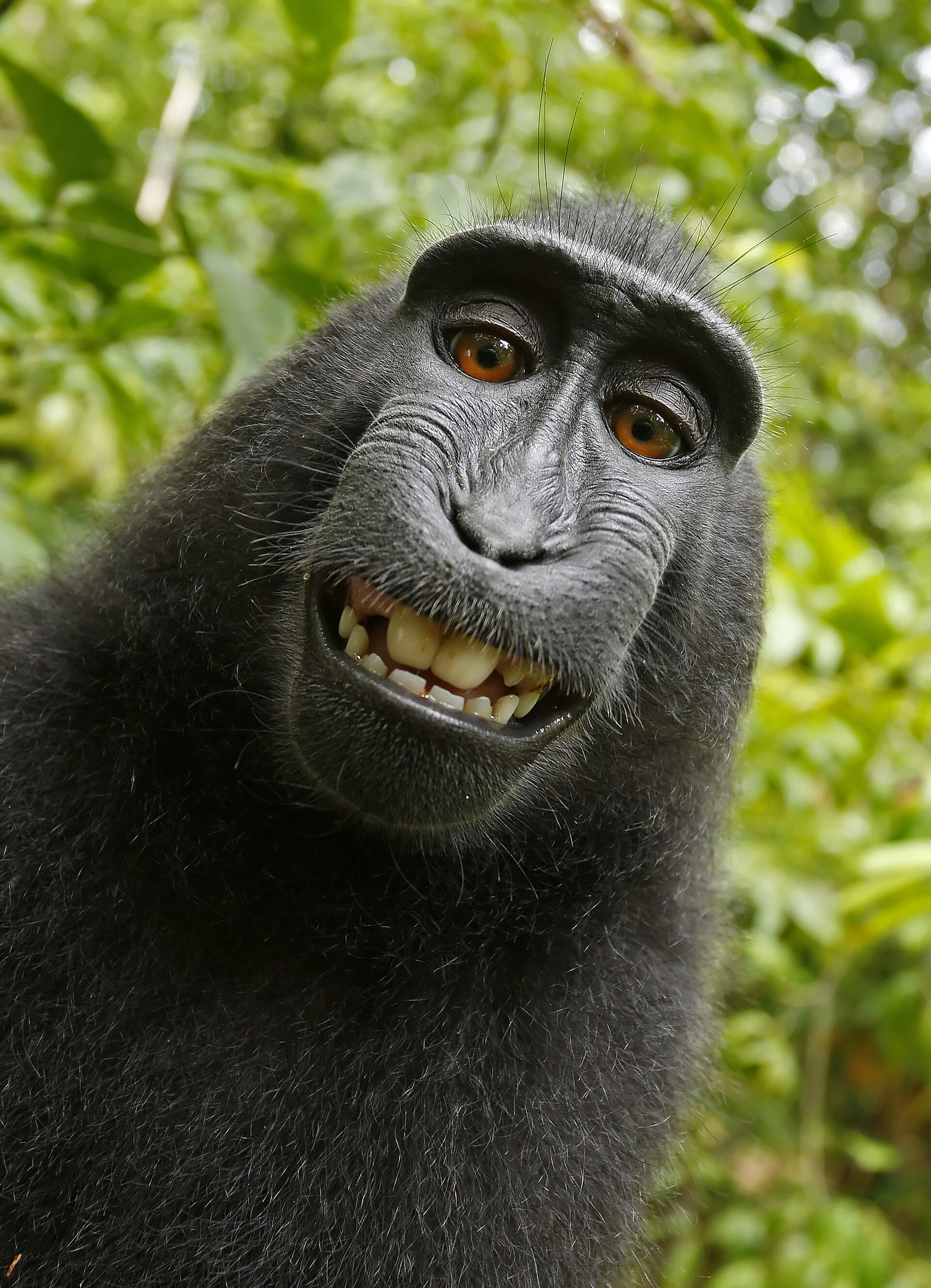Of course, a monkey wouldn't know he had legal rights even if he did. Some human beings would need to purport to represent the monkey, and that's what was going on here. People for the Ethical Treatment of Animals sought to capture the income stream from Naruto the monkey's beloved photography and offered to spend the money for the benefit of him and the various other crested macaques on the island of Sulawesi.
Here's the beloved and apparently uncopyrightable monkey selfie:

Naruto is delighted with the public domain.
ADDED: Here's an earlier post about why the copyright isn't seen as belonging to the man who set up the camera, setting up the conditions and predicting the last step, a monkey's pushing the button.




१४ टिप्पण्या:
About time to impose crushing Rule 11 sanctions on PETA.
These days, far too much of copyright and trademark (and, increasingly, patent) law is nothing more than rent seeking as the courts and legislatures have allowed intellectual property to serve the exact opposite of its constitutional purpose.
Naruto? Wait, he's a ninja?
"People for the Ethical Treatment of Animals sought to capture the income stream from Naruto the monkey's beloved photography and offered to spend the money for the benefit of him and the various other crested macaques on the island of Sulawesi."
And what better way to benefit the animals than salary increases for people on the staff of PETA?
Did you know that Christopher Stone, author of the famous "Should Trees Have Standing?", was the son of I.F. Stone?
WINNING!
Had I known of PETA's offer to spend Naruto's money, I'd have offered to do the same for only half the price PETA was going to charge.
The photographer is on one end of the copyright dispute, and PETA is on the other end. So the solution is public domain? That's stupid.
Slater (the photographer) made a bad argument (the monkey acted on his behalf). PETA made another bad argument (the monkey can own copyright-- and how the hell is PETA going to command dispensation of the royalties on the monkey's behalf?!).
Slater deserves the copyright. He did the work. He paid for the equipment and materials. The various courts should get in a smoke-filled room and clean the shit out of their collective brains.
Copyright is a debatable concept, but if we uphold it, Slater should get it.
Bob Ellison said...
The photographer is on one end of the copyright dispute, and PETA is on the other end. So the solution is public domain? That's stupid.
No. The solution is public domain because the monkey cannot have copyright. Period. Slater, who is NOT the photographer, has nothing. He didn't take the picture, didn't do the work, his ownership of the equipment is irrelevant. PETA has no standing, no interest in this case on any level.
Neither Slater nor PETA are anywhere in this dispute.
work for hire?
If I set up my camera to take a picture when the internal timer goes off, does that mean the copyright of that picture should be owned by the timer?
"Slater deserves the copyright. He did the work. He paid for the equipment and materials."
This is wrong. Owning the equipment and "doing the work" are irrelevant to copyright ownership. You have to actually author the work. Slater authored nothing.
(The "work for hire" doctrine doesn't apply here either, unless the unpaid monkey is a regular employee of Slater--and even then a signed agreement is necessary.)
Public domain. This is such settled law that both Slater and PETA should face rule 11.
Any self-respecting monkey would have stolen that camera.
Oh, so because Slater's magic index finger was not there at the magical moment, he gets no copyright? No finger, no rightee?
Stupid. If you believe in copyright, then you must decide whence it derives. If you don't believe in copyright, just say so.
टिप्पणी पोस्ट करा
Please use the comments forum to respond to the post. Don't fight with each other. Be substantive... or interesting... or funny. Comments should go up immediately... unless you're commenting on a post older than 2 days. Then you have to wait for us to moderate you through. It's also possible to get shunted into spam by the machine. We try to keep an eye on that and release the miscaught good stuff. We do delete some comments, but not for viewpoint... for bad faith.